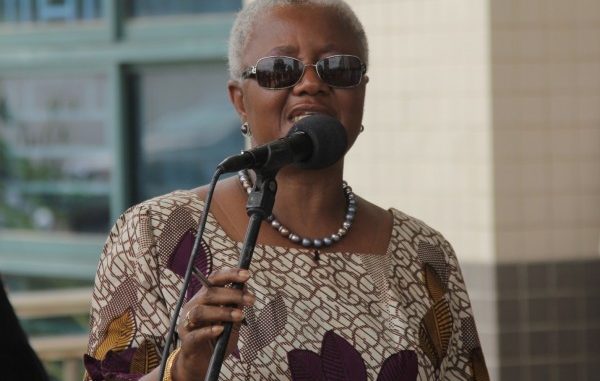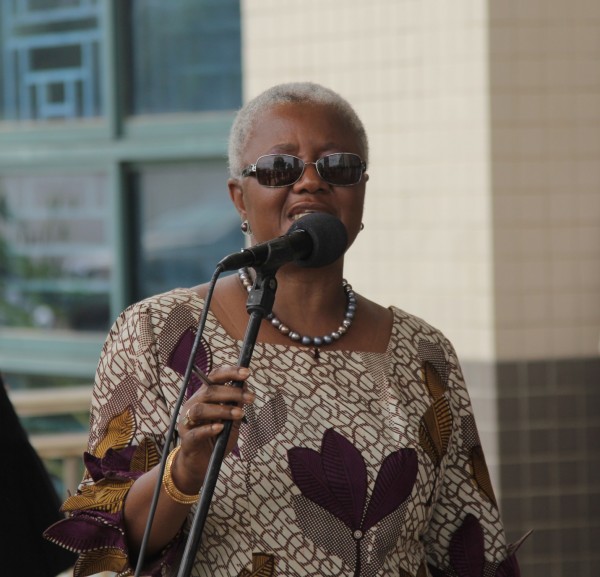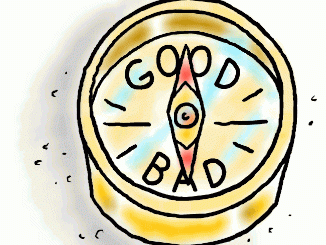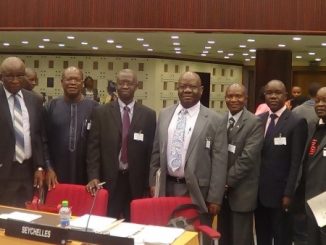
The Deputy Minister of Foreign Affairs and International Cooperation, Dr. Ebun Strasser-King, has been leading the Sierra Leone delegation at the second segment of the 69th Session of the United Nations General Assembly. This segment involves engagements in the work of various committees and conducting bilateral meetings with other nations . On October 21, the Minister addressed the meeting on the Status of the Protocols additional to the Geneva Convention of 1949 and relating to the Victims of Armed Conflict/
STATEMENT BY HONOURABLE EBUN STRASSER-KING (DR.), DEPUTY MINISTER OF FOREIGN AFFAIRS & INTERNATIONAL COOPERATION AT THE 69TH UNITED NATIONS GENERAL ASSEMBLY ON T HE STATUS OF THE PROTOCOLS ADDITIONAL TO THE GENEVA CONVENTIONS OF 1949 AND RELATING TO THE VICTIMS OF ARMED CONFLICT
NEW YORK, 21st OCTOBER, 2014
Mr. Chairman,
Since this is the first time that I am taking the floor let me, like previous speakers, congratulate you and the other members of the Bureau on your election to conduct the affairs of the 6th Committee of the United Nations General Assembly for the 69th Session. My delegation concurs with the statement delivered by the distinguished representative of South Africa on behalf of the African Group.
I am very pleased to take part in the debate on agenda Item 79 on the topic: “The Status of the Protocols Additional to the Geneva Conventions of 1949 and Relating to the Victims of Armed Conflict” particularlybecause of the bitter experiences that the people of my country went through during the period of eleven years of civil war, which witnessed some of the most brutal atrocities committed against the civilian population. Although IHL does not concern itself with internal strife, yet it is important to point out that the line, which separates human rights law, and humanitarian law is very thin.
Since this item was first introduced as an agenda item of the General Assembly in 1982, it has gained increasing popularity and significance. Therefore, its inclusion as an agenda item for this Session is very appropriate in the light of present armed conflicts and global security challenges.
Mr. Chairman,
International Humanitarian Law is based on the Geneva Conventions, the Hague Conventions as well as subsequent treaties, case law and customary international law. Its development over the years is regarded as a significant milestone to international law in general. According to the ICRC: “International Humanitarian Law is a set of rules which seek, for humanitarian reasons, to limit the effects of armed conflicts. It protects persons who are no longer participating in hostilities and restrict the means and methods of warfare.” From this definition, it is easy to see that IHL is people centered. It is inspired by considerations of humanity and the mitigation of human suffering during armed conflict. It seeks to protect non-combatants during armed conflicts and is designed to strike a balance between humanitarian concerns and military necessity.
International Humanitarian Law is as old as humanity and its observance can be traced as far back as Biblical days when in the Old Testament Prophet Elisha admonished against the slaying of enemy prisoners. According to Majid Khaduri in his Essay entitled: War and Peace in the Law of Islam, he opined that,” Islamic Law warned that noncombatants who did not take part in fighting such as women, children, monks, the aged, blind and insane were not to be molested.” Similarly, in ancient civilizations, like ancient India, according to the laws of Manu, belligerents are forbidden to use certain destructive weapons and that a fighter who folds his hands in supplication or who looks on without any involvement in the fighting should not be attacked.
However, it was not until the second half of the 19th century, the Age of Enlightenment that IHL began to take a more systematic approach and gravitation towards codification. It should be recalled that the reports of individuals like Florence Nightingale and Henry Durant on the atrocities committed during the wars of this period were so horrifying that they shocked the conscience of the world. This led to the founding of the International Red Cross and the convening of the first Geneva Convention of 1949. Subsequently, the four Geneva Conventions that came into being have received the endorsement of nearly every state in the world and they are universally binding. The Geneva Conventions have been developed and supplemented by two further Additional Protocols and Conventions. Today, many provisions of IHL are accepted as Customary Law by which all states are bound.
Mr. Chairman,
I have taken the trouble to give a modest historical development of IHL in order to emphasize the point that IHL is not lacking in jurisprudence. What is lacking is the commitment of states to abide by their international obligations and leaders to provide political leadership. War and the prospect of war remain as a constant nightmare of humanity. According to available data, 80 to 90 per cent of war victims are civilians, particularly women, children and the aged. Human life is sacrosanct, it is a gift from God and that is why IHL is designed to protect human life even in times of war. Impunity for serious crimes during armed conflict should no longer have any place in modern society. All states have the moral duty to investigate and prosecute gross violations of IHL. For this reason, we shall continue to show strong support for the Rome Statute and the work of the International Criminal Court which remains to be a credible international legal institution that addresses impunity for grave crimes.
My country, Sierra Leone, strongly supports the promotion of IHL and is deeply committed to its implementation because the rules upon which it is based are consistent with the core principles of the Charter of the United Nations. The corner stone of the Organization is firmly rooted on the belief that the fundamental human rights of people and the principles of the Rule of Law should be respected and upheld for the benefit of all peoples. Also, we highly commend the current report of the Secretary General relating to the Geneva Conventions of 1949 and Additional Protocols, which contain valuable information on various states. We also firmly support all his initiatives enjoining member states to show respect and commitment to obligations relating to the covenants of International Humanitarian Law.
Mr. Chairman,
My country will continue to support the activities of the ICRC, the umbrella institution that is explicitly named under humanitarian law as a controlling authority. We also support the Red Crescent Society and the Sierra Leone International Red Cross Society. The ICRC, as an independent and neutral organization, promotes respect for international humanitarian law and its implementation in national jurisdictions and promotes humanitarian protection and assistance for victims of armed conflict. We regret that in recent conflicts, staffs of ICRC were the target of attacks in the course of their work to serve humanity. As a post conflict country, we are aware that sexual violence in conflict is one of the greatest and most persistent injustices in the world today. We are therefore supportive of the UK Government’s Preventing Sexual Violence Initiative and subsequently, the ‘Declaration of Commitment to End Sexual Violence in Conflict’. We support the work of the UN Office of the Special Representative on Sexual Violence in Conflict. We also fully support the UK Government’s leadership in promoting global advocacy against the use of children in armed conflicts.
We sincerely hope that the 32nd Conference of the Red Cross and Red Crescent Society scheduled to be held next year will produce the desired objectives, which among others include the upscaling of implementation of IHL.
At the regional level, we work in close collaboration with the African Union and other regional Organizations.
Since 2002, the ICRC and ECOWAS have been cooperating very closely to help member states in the implementation of IHL and on enhancing respect for its rules. The annual seminars organized by the two organizations provide a helpful space that facilitates information sharing and good practices update on recent developments in IHL.
At the national level, the formation of a National Committee under the ICRC and the ECOWAS Plan of Action is a clear demonstration of the commitment of His Excellency, Dr.Ernest Bai Koroma to ensure that Sierra Leone honor, her international obligations. The task of this National Committee is to advise and assist government in the implementation and promotion of International Humanitarian Law. Its membership is drawn from various stakeholders such as representatives of government ministries, legal experts, academics, opposition parties, local and international NGO’s and the Sierra Leone Red Cross Society.
Already, the National Committee has championed the promulgation by Parliament of three important Bills: the Refugee Protection Act No. 6 of 2007, the Geneva Conventions Act No. 14 of 2012, an Act which consolidate and give effect to the Geneva Conventions of 1949 and the Additional Protocols; and the Sierra Leone Red Cross Society Act No. 15 of 2012 which reviewed the previous Act. Also, with the collaboration of ICRC and international partners, our peace keeping contingents always receive comprehensive training on the rules of International Humanitarian Law before they embark on international Missions. The Sierra Leone Military receive similar training on a regular basis.
In conclusion, Mr. Chairman, the Special Court for Sierra Leone, whose mandate was to prosecute persons who bear the greatest responsibility for serious violation of international humanitarian law and Sierra Leone law during the civil war, has finished its work. The most important legacy of the Court is that it will serve as a constant reminder to would be perpetrators of serious crimes that their actions against the people will never go unpunished no matter how long it may take. But the job is not yet completely done. The Residual Special Court, which succeeds the Special Court, has powers to continue to carry out the functions of the Special Court for Sierra Leone. It has powers to prosecute crimes against humanity as well as crimes that are in contravention of the Geneva Conventions and the Additional Protocols. This Court needs sustained financial support of the international community in order to continue to discharge its functions in the most efficient manner. We therefore call on all member states to continue to give support to this court to continue its activities to a logical conclusion.
Let me end with the inspiring words of Secretary General Ban Ki Moon which he made during a lecture at Oxford University on the topic “Human Protection and the 21st Century United Nations”, “ “The task of human protection is neither simple nor easy. We don’t always succeed. But we must keep trying to make a difference. That is our individual and collective responsibility.”
I thank you all for your attention.





Leave a Reply